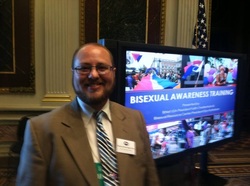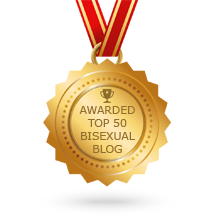 Though studies show Bisexuals to be in the majority of the LGBTIQQ community, we are often times discriminated against by all the different segments of that united community. This discrimination white noise is something that I just got used to and worked around like a sore tooth, I just chewed on the other side of my mouth and forgot that my tooth was even sore. Unless you count the times that something caused me to use said tooth in a chomping fashion. Biphobia is like that, when your identity is openly questioned on a repeated basis, from friends, acquaintances, people on the bus, your doctor, therapist and even the government, the identity that keeps coming out in multiple situations gets raw like a nerve. A few weeks ago I was the recipient of an invitation from the White House, and like much of the email that clutters my inbox from various social causes, I was about to file it away, when another email showed up telling me that I should open the invitation and accept. I was one of many Bisexual activists called on by policy makers to join them at the White House and let them know what we as a group were experiencing. This "joke" email, was a real live invitation to be part of something very real and tangible. A way forward to help my community by telling those in powerful positions just how dismal the numbers were. As many of you may remember, I worked on the Bisexual Invisibility Report with Lindasusan Ulrich, I organize the Bi/Trans Brunch and attempt to be a speakers Bureau of one for the Bay Area Bisexual Network. All of these tasks can sometimes lead to multiple levels of burnout. So when I was asked to speak before the White House in D.C., I was a little apprehensive of the seeming gag order, where we couldn't tell anyone we were going, or what was being said by anyone at the meeting itself, as this meeting was "off the record". But after I accepted the invite, I was introduced to many that I have known of in the community yet never met outside of email, an intergenerational, multi-faith, and culturally mixed group of people whom I would be working with to present our recommendations. No longer a speakers bureau of one, I was suddenly recharged and ready to attack the issues. Issues like the fact that stigma is amazingly high, when people were part of a telephone survey about who they would like to live next door to, on a scale of 0-100, the lower the number the warmer the subject was to the group. Scoring the worst numbers were Bisexual men, Bisexual women and IV Drug users. Jewish people scored a little better on the scale right under African Americans, and Gay and Lesbian people scored a right in the middle under pro/anti-choice groups. Oftentimes the researchers who could help to illuminate the issues facing the Bisexual community are relegated to aggregating the data so that the numbers are counted towards Gay and Lesbian data. However, when they pull the Bisexual data out, the numbers are really dismal. According to recent studies, we have a higher rate of tobacco use compared to all other communities, a higher rate of STI diagnosis compared to the Heterosexual community, a higher rate of heart disease compared to the Heterosexual community, and a higher rate of cancer risk factors and lower rate of screening. All of these issues lead to a poorer health outcome for Bisexuals than for the Gay and Lesbian community with Heterosexual communities having the best health outcomes. These issues are really important to me as a Bisexual activist who works at UCSF, and tries to connect people with community and knowing that they are not alone. Even the mental health outcomes are poorer for Bisexual women in urban settings, when their Lesbian counterparts receive a reprieve from the stress of the rural life, Bisexual women's mental health gets worse. Not to mention the amount of data that we have on Bisexual men is almost nonexistent. What can we do about these seemingly insurmountable issues. I think we may have made some real steps toward making things better by heading to D.C. this week. Not only did the government acknowledge that we are a distinct group, by inviting us to speak, but there was an acknowledgement from the Mayor of Washington D.C. of Bisexual Pride Awareness Day itself. This was a truly amazing part, even before all the meetings beforehand, getting ready to speak, and creating PowerPoint presentations about what the needs were, there was this one single thing, acceptance. While we are still stigmatized, even though we are the largest segment of the LGBTIQQ community, those who have the potential to be attracted and or love more than one gender are unique and accepted by people in high places. Another way forward that I see, is the creation of programming to help stem the tidal forces trying to hold us down as a community. As our Bay Area Bisexual Network mission states that we "seek to develop a healthy, vibrant, multicultural bisexual community in the San Francisco Bay Area and to promote better understanding of bisexual lives and issues within the larger lesbian, gay, bisexual, transgender, queer (LGBTIQQ) community and the public." It does indeed get better, and I ask that you join me helping to build a group that can live up to this mission, a group that can step up, and step back, a group of humans who have bad days and pass on the work when needed. What I learned after the meeting and the acknowledgement, is that we have to stick together as a community and work with our allies and sometimes people who are not allies quite yet, to get to our goal of overcoming stigma and becoming better understood by monosexual and cisgendered communities.
0 Comments
|
BABPN
Our mission is to foster a sense of bisexual/Pan+ community and promote better understanding of bisexual+ lives and issues within the larger lesbian, gay, bisexual, transgender, queer (LGBTQ) community and the public. Our Informational Blog Recently Made Number 38 on the Top 50 Bisexual Blogs!
Archives
April 2024
Categories
All
|
© 2023 Bay Area Bi+ & Pan Network (BABPN)



 RSS Feed
RSS Feed